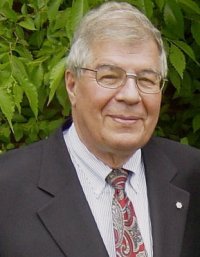Related Research Articles
The Miller Medal is an award of the Royal Society of Canada given for outstanding research in any branch of the earth sciences. The award consists of a gold-plated silver medal and is awarded every two years if there is a suitable candidate.
The American Institute of Mining, Metallurgical, and Petroleum Engineers (AIME) is a professional association for mining and metallurgy, with over 145,000 members. It was founded in 1871 by 22 mining engineers in Wilkes-Barre, Pennsylvania, United States, being one of the first national engineering societies in the country. Its charter is to "advance and disseminate, through the programs of the Member Societies, knowledge of engineering and the arts and sciences involved in the production and use of minerals, metals, energy sources and materials for the benefit of humankind."
The Canadian Mining Hall of Fame was conceived by Maurice R. Brown as a way to honor Canada's mine finders and builders, in recognition of accomplishments by leaders in the Canadian mining industry.
Duncan R. Derry, OC (1906–1987) was an internationally known Canadian economic geologist. He was largely responsible for the creation of the World Atlas of Geological and Mineral Deposits.
The Hoover Medal is an American engineering prize.

Raymond Alexander Price, is a Canadian geologist. He has used his research on the structure and tectonics of North America’s lithosphere to produce extensive geological maps. He has also provided guidance for nuclear fuel waste disposal and reports on the human contribution to Global warming.
The William H. Twenhofel Medal is the highest award given by the Society for Sedimentary Geology (SEPM). It was instituted in memory of William H. Twenhofel and is awarded annually to a person for his or her "Outstanding Contributions to Sedimentary Geology."
The Barlow Memorial Medal was created in 1916 by the Canadian Institute of Mining, Metallurgy and Petroleum to recognize the best paper on economic geology published by the Institute each year.

The Canadian Institute of Mining, Metallurgy and Petroleum (CIM) is a not-for-profit technical society of professionals in the Canadian minerals, metals, materials and energy industries. CIM's members are convened from industry, academia and government.

Selwyn Gwillym Blaylock was a part of starting the mining industry in western Canada. He was president of Teck Resources, recipient of several international awards for his work in metallurgy, and was the President of the Canadian Institute of Mining, Metallurgy and Petroleum in 1934–35. For his work he was inducted into the Canadian Mining Hall of Fame.
Louis Jean-Pierre Cabri (born February 23, 1934 in Cairo) is an eminent Canadian scientist in the field of platinum group elements (PGE) mineralogy with expertise in precious metal mineralogy and base metals at the Canada Centre for Mineral and Energy Technology (CANMET). First as Research Scientist and later as Principal Scientist (1996–1999). In the 1970s he discovered two new Cu–Fe sulfide minerals, "mooihoekite" and "haycockite". In 1983 Russian mineralogists named a new mineral after him: cabriite (Pd2SnCu).
Carl Michael Lesher is an American geologist. He is an authority on the geology and origin of nickel-copper-platinum group element deposits, especially those associated with komatiites, their physical volcanology and localization, the geochemistry and petrology of associated rocks, and controls on their composition.
The John Fritz Medal has been awarded annually since 1902 by the American Association of Engineering Societies (AAES) for "outstanding scientific or industrial achievements". The medal was created for the 80th birthday of John Fritz, who lived between 1822 and 1913. When AAES was dissolved in 2020, the administration of the Fritz medal was transferred to the American Institute of Mining, Metallurgical, and Petroleum Engineers (AIME), and is currently coordinated by AIME member society, the Society of Mining, Metallurgy, & Exploration (SME).
The Mineralogical Society of Great Britain and Ireland began in 1876. Its main purpose is to disseminate scientific knowledge of the Mineral Sciences (mineralogy) as it may be applied to the fields of crystallography, geochemistry, petrology, environmental science and economic geology. In support of this vision, the society publishes scientific journals, books and monographs. It also organizes and sponsors scientific meetings, and the society connects with other societies which have similar scientific interests. Some of these other societies are the International Mineralogical Association, the European Mineralogical Union, the Mineralogical Society of America, the Mineralogical Association of Canada, the Geological Society of London, IOM3, the North of England Institute of Mining and Mechanical Engineers and the Microbiology Society.
The Chemical Industry Medal is an annual American award given to an industrial chemist by the Society of Chemical Industry (SCI). The medal has been awarded since 1933, when it replaced the Grasselli Medal. It was initially given to "a person making a valuable application of chemical research to industry. Primary consideration shall be given to applications in the public interest." As of 1945, the criterion became "a person who ... has rendered conspicuous service to applied chemistry." More recently it has been awarded "for contributions toward the growth of the chemical industry."
The Beilby Medal and Prize is awarded annually to a scientist or engineer for work that has exceptional practical significance in chemical engineering, applied materials science, energy efficiency or a related field. The prize is jointly administered by the Institute of Materials, Minerals and Mining, the Royal Society of Chemistry and the Society of Chemical Industry, who make the award in rotation.
Frank Thomas Matthews White (1909–1971) was an Australian mining and metallurgical engineer and mineral science educator. His career included appointments in Australia, Fiji, Malaya, and Canada.
James McWillie Franklin FRSC is a Canadian geologist who helped build and advance the knowledge base of Canada's minerals industry.
References
- ↑ "Selwyn Blaylock Canadian Mining Excellence Award". CIM. Retrieved 12 July 2019.